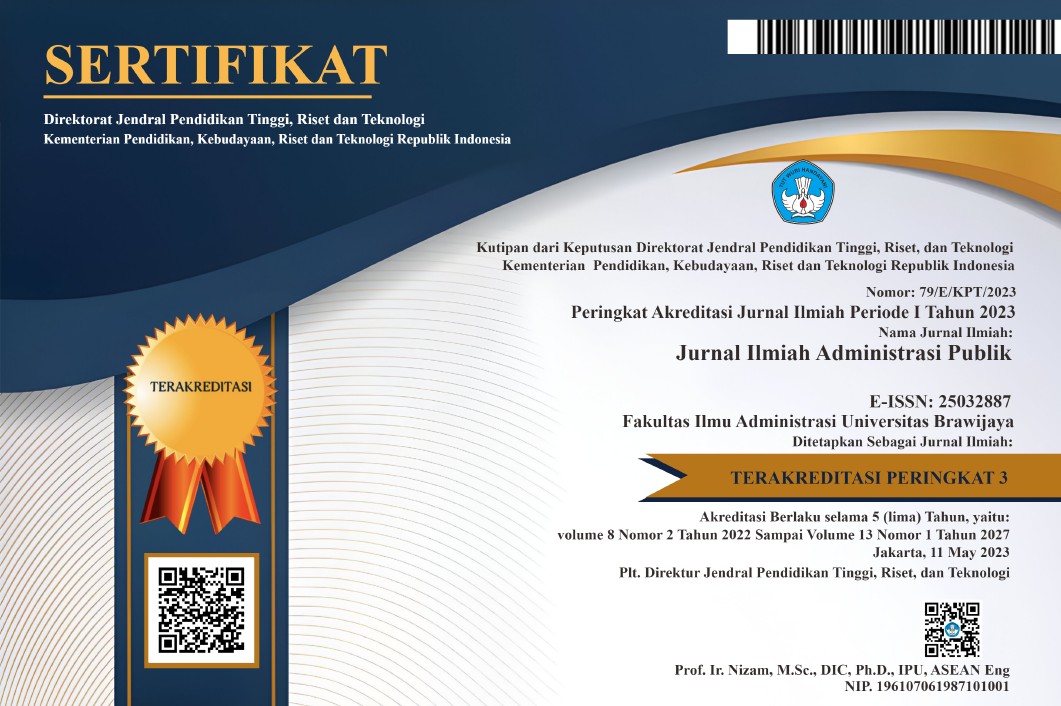External Stakeholder’s Perspective on Local Government’s Performance Information (A Study of Administrative Information in Wajo Regency)
DOI:
https://doi.org/10.21776/ub.jiap.2018.004.03.9Keywords:
local government, principal-agent theory, ILPPD, WajoAbstract
This study explored the relationship between the local government and the external stakeholders in the frame of the administrative performance information publication. The research findings show that poor practices of administration and the lack of social activism have kept the information asymmetry and goal conflict in existent. In addition, instead of making effort to overcome information asymmetry and goal conflict, the stakeholders preferred to exit the relationship. This is an exploratory single case study in the context of Wajo, a locale area with a long history of a moral system and democratic practices since the fifteenth century.References
Adi, S., Martani, D., Pamungkas, B., & Simanjuntak, R. A. (2016). Analysis of the quality of performance report of the local government on websites: Indonesian case. Cogent Business & Management, Vol. 3(1), pp.1–17.
Arrow, K. J. (1984). The Economics of Agency. Available at http://www.dtic.mil/docs/citations/ADA151436 [Accessed on August 28, 2017].
Aucoin, P., & Heintzman, R. (2000). The dialectics of accountability for performance in public management reform. International Review of Administrative Sciences, Vol. 66(1), pp.45–55.
Behn, R. D. (2002). The psychological barriers to performance management: Or why isn’t everyone jumping on the performance-management bandwagon?. Public Performance & Management Review, Vol. 26(1), pp.5–25.
Bovens, M. (2007). Analysing and assessing accountability: a conceptual framework. European Law Journal, Vol. 13(4), pp.447–468.
Box, R. C. (1999). Running Government Like a Business: Implications for Public Administration Theory and Practice. The American Review of Public Administration, Vol. 29(1), pp.19–43.
Brown, M. (2004). How Do You Rate Your Council?: A Study of the Use and Relevance of Local Government Performance Information. Glasgow, Scotland: Scottish Consumer Council.
Cohn Berman, B. J. (2008). Involving the public in measuring and reporting local government performance. National Civic Review, Vol. 97(1), pp.3–10.
Davis, J. H., Schoorman, F. D., & Donaldson, L. (1997). Toward a stewardship theory of management. Academy of Management Review, Vol. 22(1), pp.20–47.
Dooren, W. V., Bouckaert, G., & Halligan, J. (2015). Performance Management in the Public Sector (2nd ed.). London, New York: Routledge.
Dooren, W. V., & Walle, S. V. de. (2008). Performance information in the public sector: How it is used. Hampshire: Palgrave Macmilan.
Eden, R., & Hyndman, N. (1999). Performance measurement in the UK public sector: poisoned chalice or holy grail?. Optimum, Vol. 29, pp.9–15.
Eggertsson, Þ. (1990). Economic behavior and institutions: Principles of Neoinstitutional Economics. Cambridge, England: Cambridge University Press.
Eisenhardt, K. M. (1985). Control: Organizational and Economic Approaches. Management Science, Vol. 31(2), pp.134–149.
Eisenhardt, K. M. (1989). Agency Theory: An Assessment and Review. Academy of Management Review, Vol. 14, pp.57–74.
Frederickson, H. G., Smith, K. B., Larimer, C. W., & Licari, M. J. (2012). The public administration theory primer (2nd ed.). Boulder, Colorado: Westview Press.
Gailmard, S. (2012). Accountability and principal-agent models: In Chapter prepared for the Oxford Handbook of Public Accountability. Oxford, England: Oxford University Press.
Glaser, M. A., & Hildreth, W. B. (1999). Service delivery satisfaction and willingness to pay taxes: Citizen recognition of local government performance. Public Productivity & Management Review, Vol. 23(1), pp.48–67.
Ho, A., & Coates, P. (2004). Citizen-Initiated Performance Assessment: The Initial Iowa Experience. Public Performance & Management Review, Vol. 27(3), pp.29–50.
Jensen, M. C., & Meckling, W. H. (1976). Theory Of The Firm: Managerial Behavior, Agency Costs And Ownership Structure. Journal of Financial Economics, Vol. 3(4), pp.305–360.
Kluvers, R. 2003. Accountability For Performance In Local Government. Australian Journal of Public Administration, Vol. 62(1), pp.57–69.
Milgrom, P. R., & Roberts, J. D. (1992). Economics, Organization And Management. Available at http://ecsocman.hse.ru/text/19174505 [Accessed on July 18, 2017]
Mimba, N. P. S., Helden, G. J., & Tillema, S. (2013). The Design And Use Of Performance Information In Indonesian Local Governments Under Diverging Stakeholder Pressures. Public Administration and Development, Vol. 33(1), pp.15–28.
Moe, T. M. (1984). The New Economics Of Organization. American Journal of Political Science, Vol. 28(4), pp.739–777.
Montesinos, V., Brusca, I., Rossi, F. M., & Aversano, N. (2013). The Usefulness Of Performance Reporting In Local Government: Comparing Italy and Spain. Public Money & Management, Vol. 33(3), pp.171–176.
Murali, R. S. (2014). Analysis of the Demand side of Accountability in the Urban Sector. Available at http://shodhganga.inflibnet.ac.in/handle/10603/30259 [Accessed on May 19, 2017]
Nawir, M. A. (2018). Transparency of Local Government Performance: A Case of Administrative Information in the Wajo Regency, South Sulawesi Province, Indonesia. Master thesis submitted to the Graduate School of International Cooperation Studies. Takushoku University, Tokyo.
OECD. (2003). Modernisation And The New Public Executive. Available at http://www.oecd.org/officialdocuments/publicdisplaydocumentpdf/?cote=GOV/PUMA(2003)16&docLanguage=En [Accessed on April 22, 2017]
Petersen, T. (1993). The economics of organization: The principal-agent relationship. Acta Sociologica, Vol. 36(3), pp.277–293.
Pollitt, C. (2006). Performance Information for Democracy The Missing Link?. Evaluation, Vol. 12(1), pp.38–55.
Pollitt, C., & Bouckaert, G. (2011). Public Management Reform: A Comparative Analysis - New Public Management, Governance, and The Neo-Weberian State (3rd ed.). Oxford University Press, USA.
Radin, B. (2006). Challenging The Performance Movement: Accountability, Complexity, And Democratic Values. Washington DC: Georgetown University Press.
Rivenbark, W. C., & Kelly, J. M. (2000). Performance Measurement: A Local Government Response. Journal of Public Budgeting, Accounting & Financial Management, Vol. 12(1), pp.74-83.
Spence, M. (1973). Job market signaling. The Quarterly Journal of Economics, Vol. 87(3), pp.355–374.
Tayib, M., Coombs, H. M., & Ameen, J. R. M. (1999). Financial Reporting By Malaysian Local Authorities: A Study Of The Needs And Requirements Of The Users Of Local Authority Financial Accounts. International Journal of Public Sector Management, Vol. 12(2), pp.103–121.
Waterman, R. W., & Meier, K. J. (1998). Principal-Agent Models: An Expansion?. Journal of Public Administration Research and Theory, Vol. 8(2), pp.173–202.
Downloads
Published
Issue
Section
License
If your paper is accepted, the author identified as the formal corresponding author for the paper will receive an email prompting them to login into Author Services; where via the JIAP Author Licensing Service they will be able to complete the license agreement on behalf of all authors on the paper.














